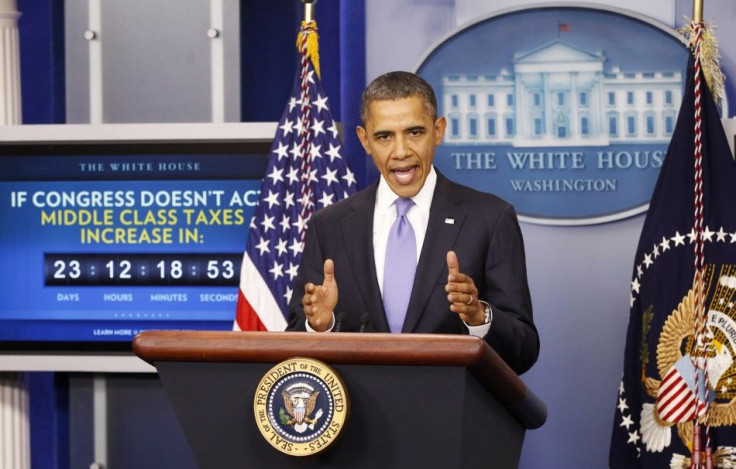Payroll Tax-Cut Fight Heads Toward Expected Deal: Aides

Democratic and Republican lawmakers skirmished on Friday over plans to extend a payroll-tax cut seen as crucial to a fragile U.S. economic recovery, but aides predicted a last-minute deal.
Although independent economists say extending the tax cut would boost the economy at a critical time, both parties have been struggling to agree on a compromise deal in a rerun of this year's budget battles that have knocked investor confidence in Washington's ability to deal with its fiscal problems.
Both parties are under pressure to strike a deal at a time of economic difficulty. Failure to do so would mean an effective tax hike for millions of voters next year, when Republicans and Democrats will face off in presidential and congressional elections.
The optics politically to be seen blocking an extension of payroll tax is lousy -- and neither wants their fingerprints of blame on it for not getting it done before Christmas, said Ethan Siegal of The Washington Exchange, a private firm that tracks Washington for institutional investors.
Senior party aides predicted on Friday that common ground would be soon be found to extend a reduction of the payroll tax, which helps fund the Social Security federal retirement program, and renew jobless benefits for millions of Americans.
Everybody figures it will happen. It has to. No one wants to raise taxes or end jobless benefits, one aide said. The only real question if it will be next week or the week after.
Democrats pounced on Republican moves to include a controversial pipeline project in the tax-cut bill, citing environmental concerns. But they also said attempts by Republicans in the House of Representatives to kill new federal controls on industrial boilers and incinerators would keep toxic pollutants like mercury in the skies for years to come.
Democrats on the House Energy and Commerce Committee said the Republican bill also would weaken U.S. President Barack Obama's landmark health-care reform law by undermining tax credits and subsidies designed to make health insurance affordable.
Keystone Bargaining Chip
Republican lawmakers have been skeptical of extending the tax cut, set to expire on Dec. 31, questioning its stimulative effect on the economy. But party leaders, fearing a voter backlash, have drawn up legislation to woo them and blunt Democratic efforts to paint Republicans as the party of the rich.
House of Representatives Speaker John Boehner of Ohio, the top U.S. Republican, said on Friday the Republican-controlled chamber would pass his party's plan, formally unveiled on Friday, early next week.
The measure would be funded largely by extending a pay freeze on federal workers. It includes a provision to speed up development of the Canada-to-Texas Keystone XL oil pipeline project, despite Obama's threat to veto any Republican effort to link the two issues.
Backers of the project say it will create tens of thousands of jobs and help tackle a chronically high unemployment rate.
Boehner sought to put the ball in Obama's court, saying, It is my hope that the president will accept this measure so that Americans can see that we are still capable of working together to the meet the challenges we face.
The White House rejected the latest Republican proposal, saying its costs needed to be offset in a balanced away and not with budget cuts exempting the rich.
Obama has delayed a decision on the pipeline pending further studies on a new route. That would push the decision past next year's election and avoid angering environmentalists before the 2012 campaign.
Senate Majority Leader Harry Reid of Nevada, a Democrat, dismissed the Republican proposal, saying, If the House sends us their bill with Keystone in it, they are just wasting valuable time because it will not pass the Senate.
Dozens of House Democrats have backed the Keystone project in the past, raising hopes among Republicans an agreement could be reached on the issue as part of an overall deal to extend the payroll tax.
Boehner crafted the provision to mesh with a proposal already endorsed by 39 Republican senators and one Democrat, Joe Manchin of West Virginia.
But a Democratic aide sketched out another scenario -- where Democrats drop their proposal for offsetting the cost of the payroll-tax cut with a surtax on millionaires in return for Republicans backing off on Keystone.
Another potential area for compromise is on the Republican demand for tougher requirements on eligibility for jobless benefits. They want to gradually reduce the maximum number of weeks for benefits to 59 from 99.
Democratic and Republican aides predicted Reid and Boehner would meet in the next few days to negotiate a final deal.
(Additional reporting by Kim Dixon, Roberta Rampton and Rachelle Younglai, Editing by Ross Colvin and Peter Cooney)
© Copyright Thomson Reuters 2024. All rights reserved.





















